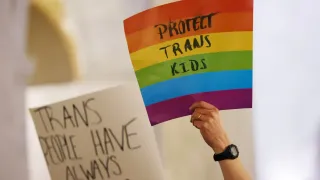May 17, 2017
May 17 is IDAHOT, International Day Against Homophobia, Transphobia, and Biphobia
READ TIME: 6 MIN.
May 17 is International Day Against Homophobia, Transphobia, and Biphobia. It was created in 2004 to draw the attention of policymakers, opinion leaders, social movements, the public and the media to the violence and discrimination experienced by LGBTI people internationally. This year's IDAHOT focuses on "families."
This focus includes both the role of families in the well-being of their LGBTIQ members and the respect of the rights of LGBTIQ families (rainbow families). We also, of course, want to use this focus issue to counter the reclaiming of family values by conservatives.
We hope that this focus issue on families will strengthen the visibility and voice of LGBTIQ parents; strengthen the visibility and voice of Rainbow families and lead to advances in recognition and rights; strengthen the visibility and voice of children of LGBTIQ parents, and possibly strengthen the structuring of their nascent movement; reclaim "family values" in a progressive understanding; and facilitate alliances with progressive family organizations.
Many actions will focus on the horrible situation in Chechnya this year, where dozens of LGBT people have been rounded up, tortured and killed by government forces. Around the world, rallies and protests are being organized to denounce the situation and put pressure on leaders to bring it to an end.
But while mobilization grows in some parts, IDAHOT events have had to be cancelled in several places due to pressure from opponents, as in Lebanon or Bosnia. In the Caucasus country of Georgia, activists have been driven off the streets by violent attacks for several years now, as opponents "claim" May 17 as the "day of traditional families."
To denounce the frequent usurpation of family values by conservative movements, this year the IDAHOT teamed up with the International Family Equality Day, which is being celebrated on May 7 this year, to declare that "Love is what makes a family." Rainbow families, parents of LGBT children and all their allies, have rallied around this motto to organize events in over 50 countries.
These and all the other IDAHOT events will underline the tragic situation faced by many LGBT people along with their families. But they will also, and surely foremost, be a celebration of the courage, the strength and most of all the love, that drives the fight for the rights of sexual and gender minorities.
In under a decade,�May 17�has established itself the single most important date for LGBTI communities to mobilize on a worldwide scale. The Day represents an annual landmark to draw the attention of decision makers, the media, the public, opinion leaders and local authorities to the alarming situation faced by lesbian, gay, bisexuals, transgender and intersex people and all those who do not conform to majority sexual and gender norms.
May 17 is now celebrated in more than 130 countries, including 37 where same-sex acts are illegal, with 1600 events reported from 1280 organizations in 2014. These mobilizations unite millions of people in support of the recognition of human rights for all, irrespective of sexual orientation or gender identity or expression.
The International Day Against Homophobia, Transphobia, and Biphobia is not one centralized campaign; rather it is a�moment�that everyone can take advantage of to take action. The date of May 17th�was specifically chosen to commemorate the World Health Organization's decision in 1990 to declassify homosexuality as a mental disorder.
The International Day against Homophobia, Transphobia, and Biphobia�has received official recognition from several States, international institutions as the European Parliament, and by countless local authorities. Most United Nations agencies also mark the Day with specific events.
May 17 was first known as the "International Day against Homophobia" and mainstreamed through its acronym "I.DA.HO" In 2009, transphobia was added explicitly in the title of the name, in recognition of the very different issues at stake between sexual orientation and gender expression. "IDAHOT" became another popular acronym used alongside the initial one.
Since 2015, biphobia is added to the title, to acknowledge the specific issues faced by bisexual people. A new acronym, IDAHOBIT, has started to be used by groups in Australia and the UK mostly.
To acknowledge this diversity, we use all three acronyms increasingly in our communications. Wherever we can only use one acronym, we favor the acronym IDAHOT, as being the one most in use at the global level.
To ensure even more inclusion and reflect the diversity of sexual and gender minorities, we have created on a global scale the baseline "A global celebration of sexual and gender diversities." This is probably the only "solution" to the issue of inclusion and reflection of other diversities, such as Queer, Asexual, Pansexual and regional identities such as Hijras, Weres, Two-Spirit, etc.
The Day is not one central trademarked brand, and everyone is free to communicate as they wish. This creates inconsistency, but this is the cost to bear for large ownership.
For IDAHOT 2017, Chelsea Manning will be released. In one of his last moves in office, President Barack Obama commuted all but four months of the remaining prison sentence of Manning, the Army intelligence analyst convicted of a 2010 leak that revealed American military and diplomatic activities across the world.
As reported by the New York Times, "the decision by Mr. Obama rescued Ms. Manning, who twice tried to kill herself last year, from an uncertain future as a transgender woman incarcerated at the men's military prison at Fort Leavenworth, Kan. She has been jailed for nearly seven years, and her 35-year sentence was by far the longest punishment ever imposed in the United States for a leak conviction."
The date of the liberation coincides with the IDAHOT, on May 17, which turns this decision into a much broader acknowledgment of the situation faced by trans prisoners in U.S. jails.
For more information, visit dayagainsthomophobia.org






